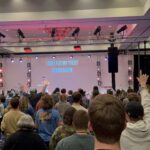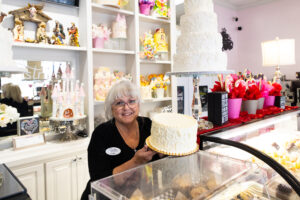
 Each fall Good Community Church in Torrance, California, hosts the South Bay Youth Revival, which includes youth and college students from San Jose and the Silicon Valley. Photo courtesy of Good Community Church.
Each fall Good Community Church in Torrance, California, hosts the South Bay Youth Revival, which includes youth and college students from San Jose and the Silicon Valley. Photo courtesy of Good Community Church.The more time Paul Kim spent with his fellow Southern Baptist pastors, the more he saw the discrepancy between the way he led Good Community Church of Torrance, California, to do missions, and the way Southern Baptists did missions. The church doubled in size after he refocused his congregation to join together with other Southern Baptist churches for cooperative missions.
Good Community Church was organized in 1991. By 2007, it had grown to five hundred people participating in Sunday morning worship. They gave token acknowledgement of their tie to Southern Baptists by giving one hundred dollars a month to missions through the Cooperative Program.
Missions was important then as now, but most of their missions offerings went to independent missionaries in Korea, South America, the Middle East, and more. But as Kim’s relationships grew with other pastors and leaders in the Southern Baptist Convention, he became aware that the church he pastored didn’t have a good accountability and financial integrity system for all their missions support.
He came to realize the SBC provided the accountability, financial integrity, missions zeal, and doctrinal purity Good Community Church wanted to be part of, and he directed the church to work with the SBC’s two mission boards—International and North American—as they looked for missions opportunities.
By 2013, more than one thousand people were participating in one of five Sunday morning worship services—not counting the Hispanic and Japanese congregations that use Good Community’s building rent-free—and they gave thirty thousand dollars to missions through the Cooperative Program, 5 percent of their operating budget.
“Our church focuses on two things: worship and prayer,” said David Yoon, English ministry pastor at Good Community. “Early-morning prayer really sets the tone for what the missions and vision of the church is.
“Families who join the church really want to come on board and share in that vision,” Yoon continued. “In the last five years, that message has really penetrated these families, and they are giving that vision to their children.”
It’s a vision with long-standing appeal. Koreans are known for their commitment to prayer and to fulfilling the Great Commission by going out or by sending others as missionaries. Their ethnic fellowship group—Korean Council of Southern Baptist Churches in America—is designed to help them do that.
And through the Cooperative Program, they can be a part of sending out even more: 4,800 missionaries this year through the International Mission Board, and a similar number through the North American Mission Board.
“I believe in the power of collaboration,” said Man Poong “Dennis” Kim, pastor of Global Mission Church of Greater Washington in Silver Spring, Maryland, where about 1,600 people participate in Sunday morning worship. “That is the reason I have always led the Global Mission Church to be faithful in its participation in the Cooperative Program.”

Pastor Man Poong “Dennis” Kim of Global Mission Church baptizes a young woman in Chesapeake Bay, surrounded by leaders of the church’s college ministry. Photo courtesy of Global Mission Church.
Like Paul Kim of Good Community Church, Man Poong “Dennis” Kim (no relation), former president of the Korean Council and 2014 presidential candidate for the SBC, became more interested in the Cooperative Program as he saw its effectiveness. “With a steadfast commitment to world missions, our church is training and sending more than ten short-term mission teams every year, and it has produced more than fifty career missionaries working for the IMB.”
Byungh Choi, pastor of Zion Korean Baptist Church in Jacksonville, Florida, was born into a Southern Baptist family in Korea, and graduated from New Orleans Baptist Theological Seminary in Louisiana. He started Zion Korean in 2008—today about 120 people participate in Sunday morning worship—and provides ever-increasing support to the Cooperative Program as the congregation grows.
“First of all, our church was started with Cooperative Program support,” Choi said. Southern Baptists also provided him with a theological education through New Orleans Seminary. “I received a great amount of gift from Southern Baptist churches so our church must give back to Southern Baptists.
“The purpose of Southern Baptists is not only [helping] one church, but all lost people,” Choi continued. “That is why we continue to be a part of the Cooperative Program.”
In Huntsville, Alabama, Chun-Ho Choi is pastor of Huntsville Baptist Church, a Korean congregation where about one hundred people worship together on Sundays, followed in typical Korean style with a traditional Korean meal.
Despite the relative size of the church, they gave nearly $1,500 last year to missions through the Cooperative Program, which was a sizable increase over the previous year. The pastor credited the congregation.
“All church members get together and decide [the budget],” Choi said. “Cooperative Program is missions. It helps fulfill Great Commission.”

Several youth from Good Community Church travel to Vietnam every summer to help in an English camp hosted by IMB missionaries. Photo courtesy of Good Community Church.
He was born in Korea and graduated from a Baptist seminary, the pastor said. “I like Southern Baptist theology. I like the Southern Baptist focus on the Bible.”
Yong Kyu Cho, pastor for sixteen years of First Korean Baptist Church in Radcliff, Kentucky, where about eighty participate in Sunday morning worship, said he led the church to support the Cooperative Program because he trusts it.
“Southern Baptists are missionary-oriented people,” Cho said. “We believe the offering will be utilized for missionary work, IMB and NAMB. . . . I am always grateful to serve God and country and Southern Baptists.”
Southern Baptists work together and as a result get much more done than could be done without cooperation, said David Gill, founding pastor of Concord Korean Baptist Church in Martinez, California, where 650 people gather Sundays for worship.
“I am a Christian by conviction but a Southern Baptist by choice,” said Gill, who was led to the Lord by a missionary in Korea when he was sixteen, and became second vice president of the SBC in 2004.
“I am a product of the Cooperative Program because I went to Golden Gate [Baptist Theological Seminary], which is supported by the Cooperative Program, and we planted a church in the San Francisco area with the help of the Cooperative Program,” Gill said. “I am more grateful to the Cooperative Program because seven units went out as IMB missionaries from my church. All that is only possible through the Cooperative Program and cooperative efforts.”

















